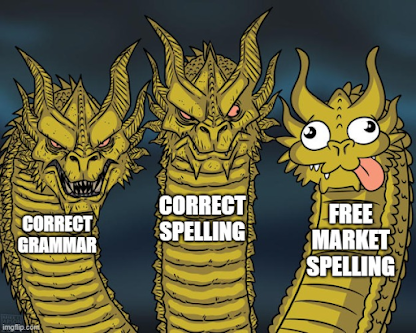Free Market Spelling: If Merchandise Sells Either Way, Does Spelling Matter?
Except when it comes to newly developed slang, spelling has been standardized in the United States since 1806, when Noah Webster published his first dictionary. Words are supposed to be spelled a certain way so that everyone can read them and know what they mean. However, sometimes, companies will still sell misspelled items and make money off of them. If a product is still making money, does it matter whether or not it's misspelled?
Created via the imgflip meme generator
Jeff Deck's Experience
In chapter 16 of his book The Great Typo Hunt, Jeff Deck chronicles an experience in which he noticed a typo in a piece of merchandise at a festival booth. Instead of using the standard, correct French spelling of "Bon Appetit," this store had printed and started selling a sign that said "Bon Appetite."'
Created via the imgflip meme generator
Deck, who was on a cross-country road trip to correct typos, brought this issue up to the lady running the booth. He at first asked her if it was a pun. After all, the only way this spelling would have made sense was if it were a pun. The lady replied brusquely, "It's not a pun; it's a phrase." When Deck pointed out the spelling error, she responded, "Well, people are still buying it!"
Created via the imgflip meme generator
So, does this woman have a point? Not at all. Her spelling of the French phrase "bon appetit" disrupted the meaning and the pronunciation. In French, "bon appetit" directly translates to "good appetite." Yes, appetite is part of the meaning, but her spelling literally changed languages halfway through. That's why Jeff Deck initially thought it was some kind of pun. For all we know, the fake pun was why people bought the sign in the first place.
Created via the imgflip meme generator
Emily Favilla's Take
In her book A World Without "Whom," editor Emily Favilla has her own opinion on "free market spelling." Other than minor spelling differences, such as OK vs Okay, Favilla thinks it's important to get things right when it comes to spelling.
Created via the imgflip meme generator
On this subject, I am inclined to agree with her. As she says, getting certain spellings right helps people avoid "coming off as uneducated" and creating "a reputation for being less than trustworthy." Not all spelling errors are going to come off as puns. In fact, in a language like English, misspelling a word by one letter can change its meaning entirely. If someone writes the word "principal" when they really mean "principle," their meaning will be corrupted. People won't have faith in someone who always types, "It's the principal of the thing." After all, principal refers to an administrator who runs a school, whereas principle (the word that should be in this phrase) refers to a "rule or code of conduct."
Created via the imgflip meme generator
My Take on Free Market Spelling
Will a piece of merchandise stop selling entirely if it contains a misspelling? Probably not. Some people simply won't realize the difference. They'll buy things like the "Bon Appetite" sign and put them on display in their houses. Visitors who notice the misspelling will react one of two ways: They will have less faith in the buyer of the sign, or they will be misled into an incorrect spelling.
Created via the imgflip meme generator
Store owners, though, most likely won't care about reinforcing poor spelling, even though they should. One thing I guarantee they will care about, though, is losing money. Some people will notice the error and automatically decide not to buy a piece of merchandise. So, to the lady who says that "people are still buying" her poorly spelled sign, I say, "More people could be." Correct spelling isn't just something that snobby people will notice. When it comes to "free market spelling," companies are shooting themselves in the foot. Why would they allow that to happen when a simple spelling correction would fix the issue?
Created via the imgflip meme generator










